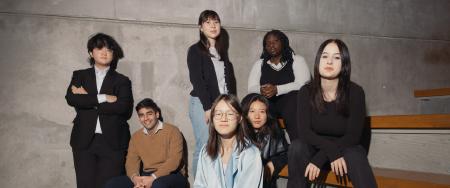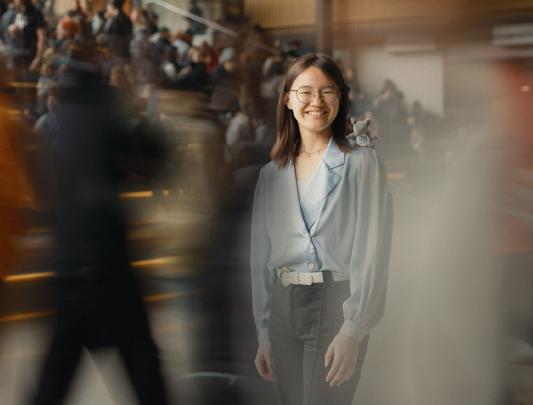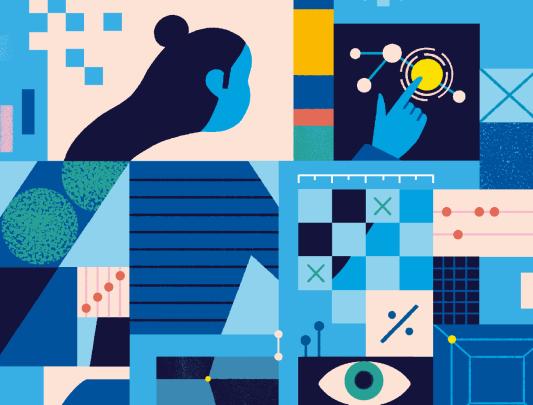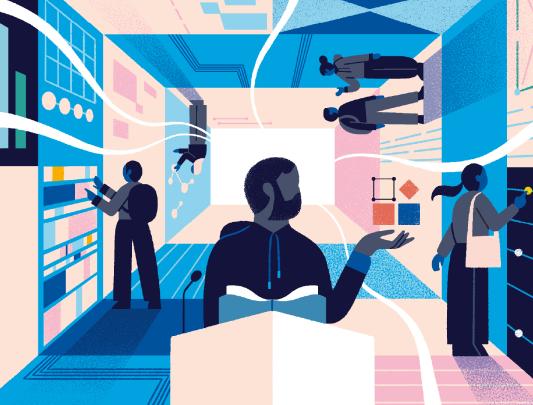
Credit: @lgc_photographer
High five
These UBC students are shaping a better world.
Ocean Champion
Bodhi Patil, 21
Studying oceanography, climate justice, and business
Oceans have always been a big part of Bodhi Patil’s life. Indonesia, Qatar, Hawaii, and Vancouver are among the coastal environments he had lived in by the time he entered university.
“My love for the ocean came from always living in, on, and around the water,” says Patil, who studies oceanography, climate justice, and business. “The ocean is something beautiful and powerful. The blue heart of our planet. And I decided I would dedicate my life to protecting it.”
Patil was only a sixth grader when he launched his first organization, a social enterprise called InnerLight that organizes workshops and conferences to help young people cope with the trauma of the climate crisis and inspire them to action. “It’s something I’m still refining at UBC. Being in a university setting is helping me give a more intellectual backing to my business and brand,” he says.
Now in his third year, Patil has been busy. In addition to InnerLight, he manages Ocean Uprise, a climate education and advocacy organization he founded during his gap year in Oahu, Hawaii. Recently, he organized a delegation of eight UBC students to join him for IMPAC5, the Fifth International Marine Protected Areas Congress, which was held in Vancouver. That team championed a ban on harmful deep-sea mining of rare minerals, which was recently implemented by the Canadian Ministry of Ocean and Fisheries.
In addition to concrete policies and solutions, Patil’s work focuses on mental health and inspiring optimism amid what he sees as Earth’s bleakest hour. He believes collective action begins with a collective mindset, and so far the climate movement has been focused on the causes, rather than the solutions, of the climate crisis. But now is the time for positivity, he argues.
“The time of ‘solutionism’ has come,” he says. “For every ‘no,’ there is a ‘yes.’ This is something that my professor Dr. Naomi Klein taught me in our environmental justice class: By saying ‘no’ to, for instance, a fossil fuel development, we also need to have a ‘yes.’ A ‘yes’ to a new source of energy. A ‘yes’ to renewables. Solutionism is all about being a part of the solution to a healthier environment.”
This winter, Patil will travel to Dubai for the United Nations Climate Change Conference (COP 28), where he will join a group of 15 Indigenous wisdom keepers from around the world to discuss climate justice for Indigenous peoples.
After graduating from his Bachelor of Arts and Master of Management dual degree program, Patil plans to pursue a PhD in the intersection of ocean science, policy, and finance, specifically around coral reef community resiliency.
“My school and my work and my life’s purpose overlap,” he says. “My chosen courses are directly related to my life mission, which is helping a generation discover their inner light.”
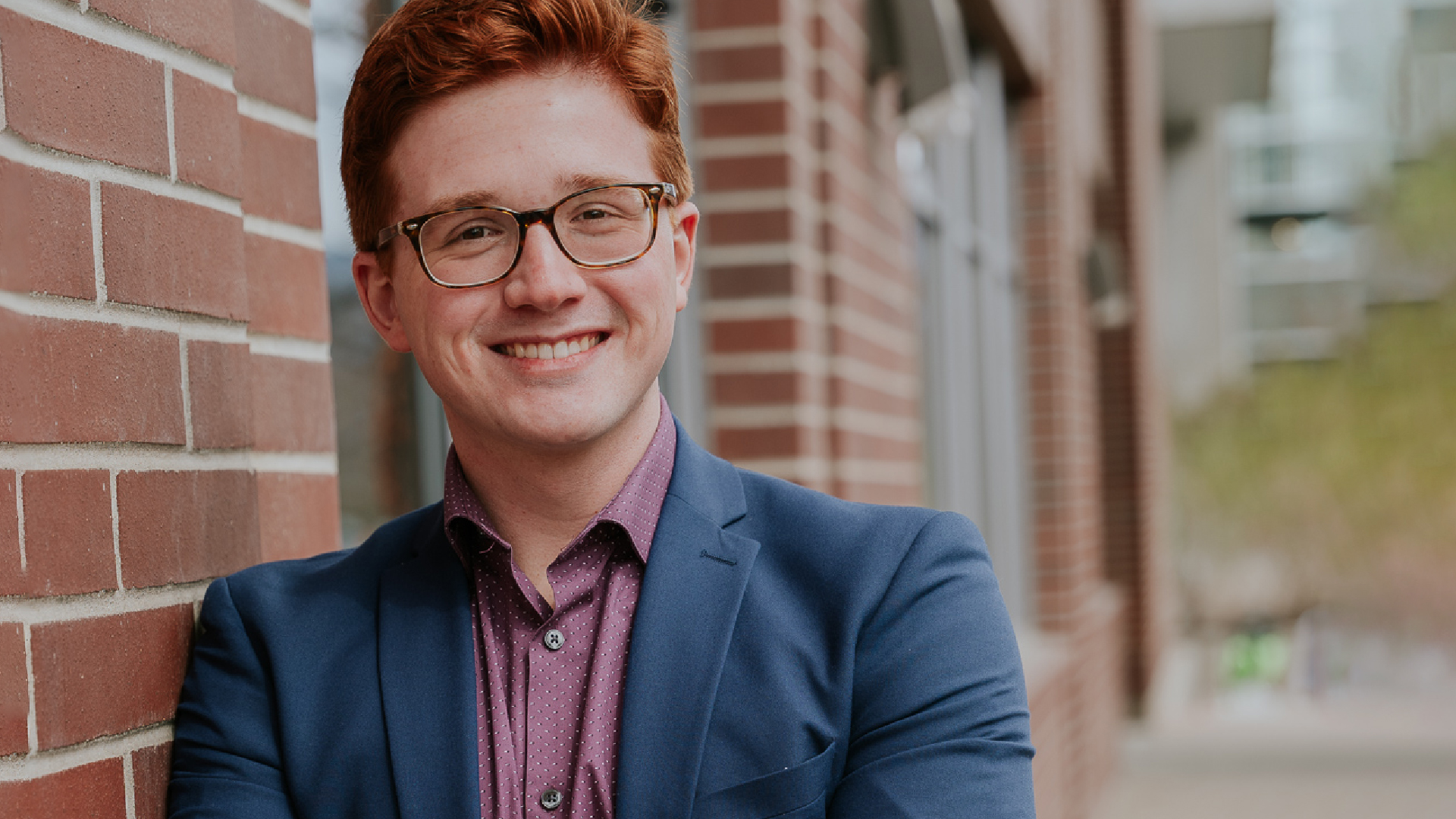
Progressive Leader
Cade Desjarlais, 21
Studying political science
When Cade Desjarlais ran as a candidate for the New Democratic Party in the 2021 federal election, he knew he would not win. It wasn’t because he was only 19 at the time, but rather that he was a staunch liberal in Kelowna Lake Country, which was staunchly conservative.
Yet his run wasn’t about winning; it was about gathering a community of like-minded people to support what they believed in – liberal economics, resources for poor and vulnerable communities, and protections for Indigenous peoples. “I wanted to make sure someone I believed I could vote for was on the ballot. And when I didn’t see that person, I decided to put my name forward,” Desjarlais says.
Now, as president of the UBC Okanagan Students’ Union (SUO), Desjarlais has finally turned his progressive principles into progressive policies. He and his colleagues helped increase student coverage for mental healthcare from $500 to $1000, and they pushed for more accessibility in Okanagan public transportation, resulting in three new planned accessible routes for students. At the SUO EXPO event, they raised around $15,000 for the campus food pantry.
Overall, it has been a more positive experience than his first political outing, during which his support for vaccination and mask mandates elicited online harassment against him and his family. But those experiences did not quell his passion for making a positive impact on his community – a passion he will bring with him to law school when he finally graduates from UBC Okanagan.
“My guiding principle is that what you put into something is what you’re gonna get out of it. I think that if you can actually advocate for people and listen to their needs, then you not only make that positive change, but in turn will guide your own view of the world.”

Innovative Healer
Anjali Menon, 22
Studying biomedical engineering
Anjali Menon’s medical career was motivated by the five hours she spent in an emergency room seeking treatment for a family member, whose Crohn’s disease (an autoimmune disorder that affects the digestive tract) was causing paralyzing spasms of pain. When the pair finally got an audience with a doctor, he said he wasn’t equipped to deliver the required treatment.
“At that point, I was like: Okay, if a doctor isn’t going to help, then what can? A new technology that I could innovate?” Menon recalls.
That experience led Menon to co-found the MEDIC Foundation, a research and advocacy organization that champions new technologies and treatments for chronic illnesses. MEDIC (which stands for “Medical Engineering Students Designing Innovations for a Cause”) is not a UBC organization, although Menon collaborates with faculty and students to raise awareness for chronic diseases and champion new technologies and treatments.
Now in her fifth year as a biomedical engineering student, Menon and her colleagues have worked with the Pacific Parkinson’s Research Centre to help develop potentially novel treatments for Parkinson’s disease. They are also working with UBC’s Artificial Intelligence in Medicine Lab to develop a cancer diagnostic search engine. Another project aims to develop a new type of insulin pump to be distributed in Sri Lanka, the home of MEDIC co-founder Madhini Vigneswaran.
Menon herself is from Mumbai, India, and she says MEDIC is particularly focused on overlooked or underserved communities, be they developing nations like Sri Lanka, or victims of lesser-known ailments like Crohn’s disease. So far, they have relied on resources and partnerships from within UBC, but as she prepares to graduate, Menon is already planning to grow MEDIC beyond the confines of campus. Perhaps one day, for Menon and her colleagues, nothing will be out of reach.
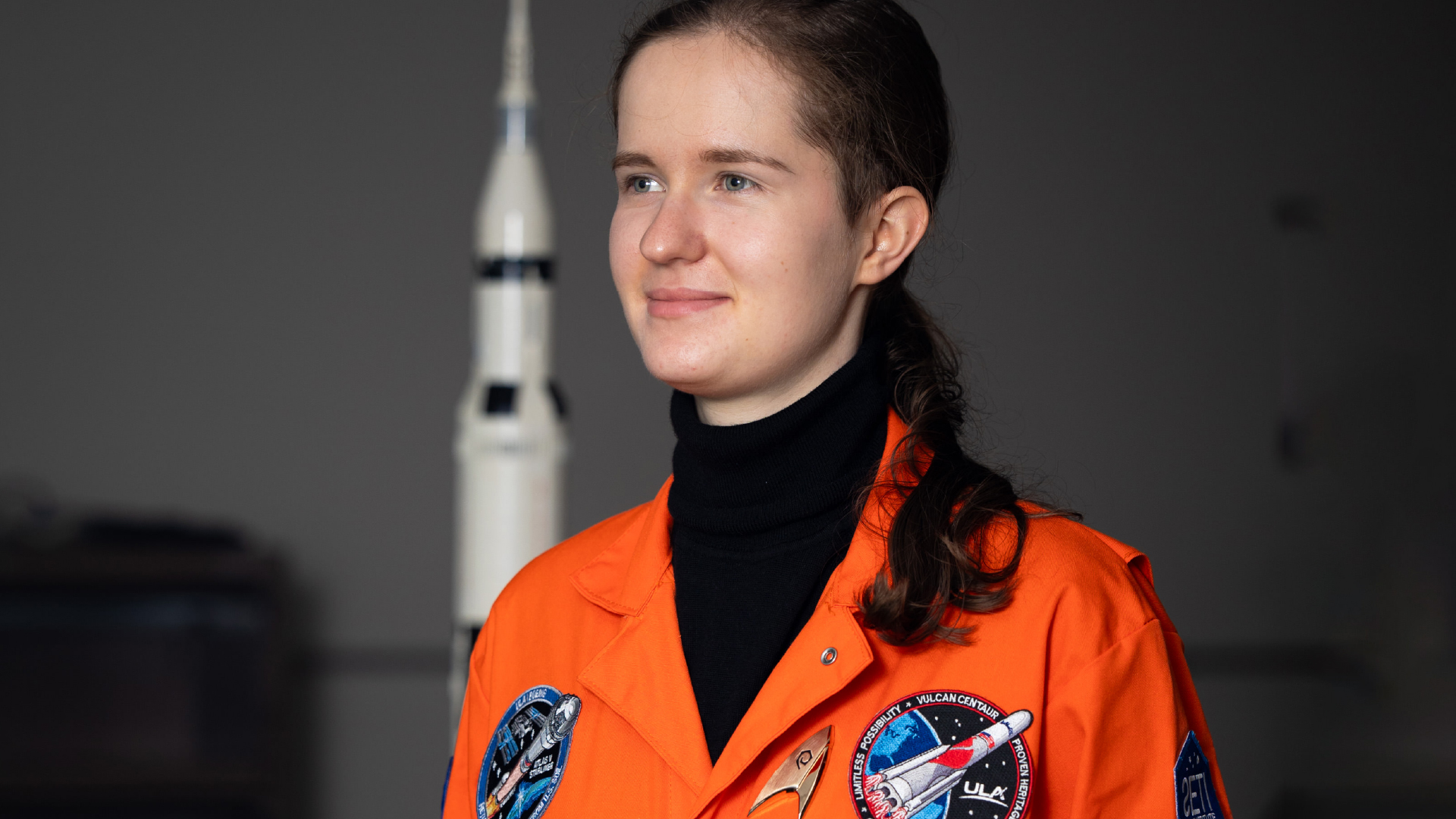
Stellar Student
Alyona Glazyrina, 19
Studying aerospace engineering
If you ask Alyona Glazyrina why she decided to pursue aerospace engineering, she will say “Star Trek.” She had wanted to be an archaeologist, but after discovering the cult TV show, her life changed.
“I started watching the original series, and I was like, ‘You know what? I want to work on a starship. But those don’t exist yet, so I guess I need to learn how to build one.’”
She was only 15 when she entered university to pursue this goal, thanks to an accelerated program co-run by UBC, the Vancouver School Board, and the BC Ministry of Education. “Fortunately I was pretty tall for my age and could blend in,” she says.
As she matured, so did her passion for the technologies of tomorrow: Glazyrina is now in her fourth year at the Department of Mechanical Engineering, specializing in aerospace. She is also captain of UBC Mars Colony, a student design team focused on developing technology to support a future colony on the Red Planet.
Glazyrina’s studies blend technology, science, and humanities. In one class, for example, she learned the principles of social engineering – ie, how to improve the places we work and live. How can sidewalks be more traversable? How can train stations feel more secure? How can interplanetary bases be more hospitable for the people living there?
The latter question falls within the purview of the engineering students at Mars Colony. “At UBC Mars Colony, we focus not on a specific product, but on any technology that can be used in the colonization of Mars,” Glazyrina explains. During her time as captain, Glazyrina has overseen the completion of a “Sabatier reactor,” which can turn hydrogen and carbon dioxide into water and methane – the former necessary for human survival, and the latter for rocket propulsion. Last year, the team presented their device at the International Astronautical Congress in Paris.
Like any Trekkie, Glazyrina is equally interested in the moral and philosophical questions of space exploration. What will interplanetary diplomacy look like? Who can mine on the moon? “There are a lot of big conversations we need to have, as humanity, regarding rules, regulations, and laws,” she says.
After she graduates, Glazyrina will continue to tackle the biggest problems in space travel, both technological and philosophical, at graduate school in Europe. In the meantime, she likes to end conversations with a blessing from that future: “Live long and prosper.”
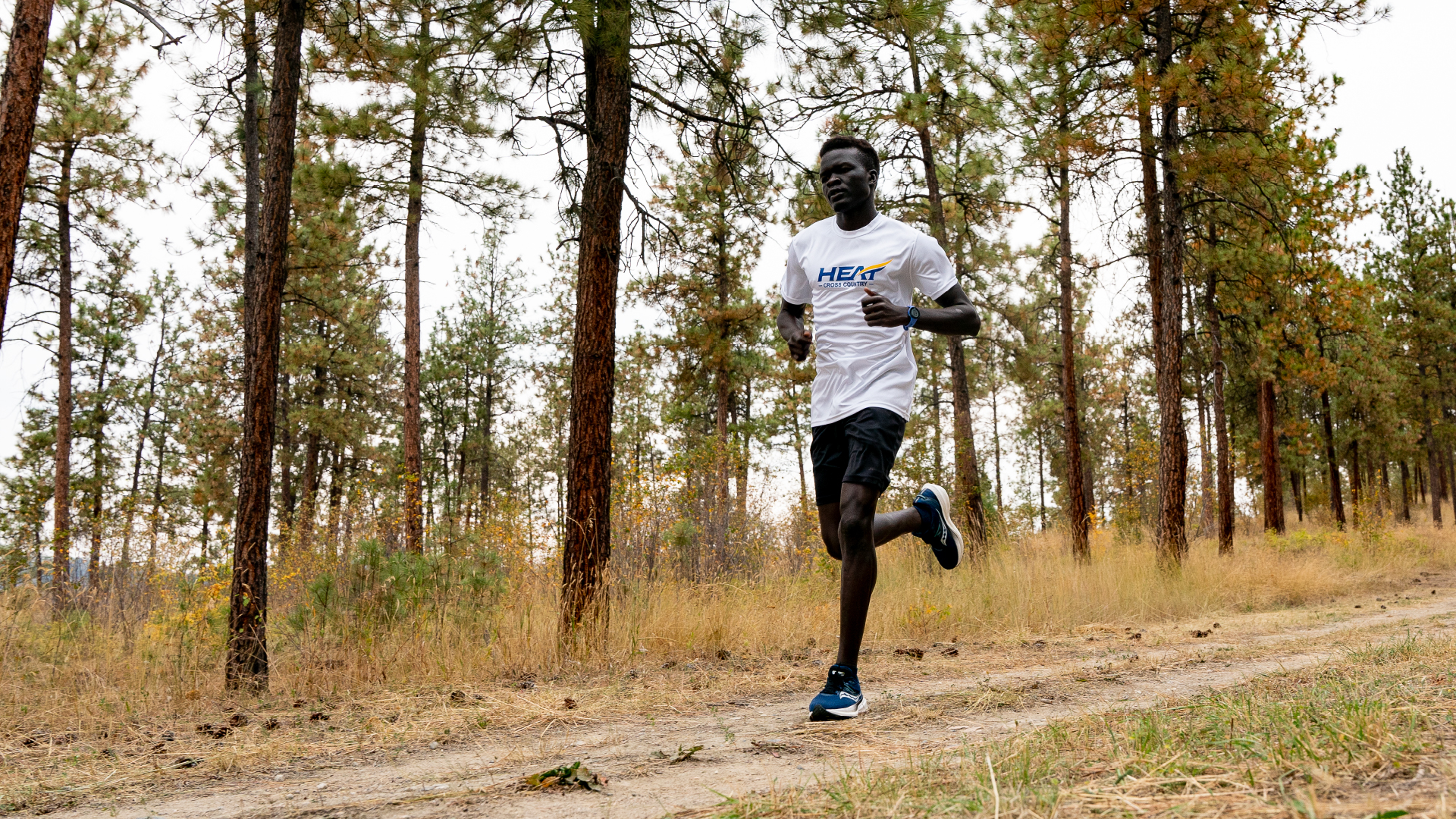
Human Rights Advocate
James Achuli, 20
Studying international relations
This summer, James Achuli travelled from his home in the Okanagan to the refugee camp in Uganda where he used to live. There, he met a teenager who fled his home in war-ravaged South Sudan, joining the endless flow of refugees on their way to Uganda. The boy slept on the road, begged for scraps, and at times ate leaves and twigs just to fill his stomach.
Speaking to the boy, Achuli didn’t have to imagine what it had been like. He had lived it.
“That’s very similar to how I came to Uganda from South Sudan,” Achuli says. “Just following a moving crowd and not knowing where I was going.” (Read his story here.)
Achuli’s childhood in Sudan was severely affected by war and violence, and he spent most of it in an internally displaced persons camp. He was fascinated with the UN helicopters that brought in food and supplies, and his father told him that he could fly one if he got something called “education.” Thus, he threw himself into “this education thing,” attending a school near a military barracks and always carrying his collection of textbooks in a waterproof backpack.
When his school was caught in a surprise attack, Achuli barely managed to survive and shortly after was forced to become a child soldier by government forces. He managed to keep his bag of textbooks, clinging to it even when he leaped into a river to escape the army and walked more than 500 perilous kilometers to neighbouring Uganda. He kept up his studies in a Ugandan refugee camp and through sheer determination and tenacity eventually won a scholarship to attend an International Baccalaureate high school program in Armenia. From there, he won a highly competitive scholarship to study international relations at UBC Okanagan. Despite the Canadian chill, he has learned to love his new life. He is close with his host and loves to cook them dishes from home.
Achuli’s story has a happy ending, but for many of the nearly 2.5 million people who have fled ongoing violence in South Sudan – 65 percent of whom are under 18 – the future remains uncertain. Achuli can never lose the painful memories of his past, but he is using his experience helping young refugees, particularly through education. While visiting the refugee camp this summer, he spoke about the power of education and helped students understand the educational resources available to them. “When I talk about my journey, I think a lot of people get inspired and try to give it a shot as well.”
He also keeps in close contact with seven other South Sudanese teenagers who were able to attend his same school in Armenia. “It’s really important to keep in touch because if we want to make an impact, it’s not just going to be about me, right? I can’t do all that on my own. But if we come together and work as a team, we can do something significant.” One of these collaborations served the needs of women and girls, who tend to be a majority in refugee communities, Achuli explains. Last summer, he and his cousin coordinated with various aid organizations to purchase and distribute feminine hygiene products, which are too often in short supply, “a huge challenge that makes them miss their exams or important lectures.”
In addition to his camp visit, Achuli was invited to speak at this year’s North America Refugee Health Conference in Calgary, where he shared the stage with Nobel laureates and the Lieutenant Governor of Alberta. When he graduates, Achuli plans to pursue a master’s and then continue his work as an advocate for refugees, either abroad or for those who have resettled in Canada.
“There are 2.5 million refugees from South Sudan, but all these figures and data, they don’t describe emotions. They don’t tell us what it is like to be a refugee,” he says. “So whether I decide to stay in Canada or go back to East Africa, I want to do what I can to help change their lives.”
























